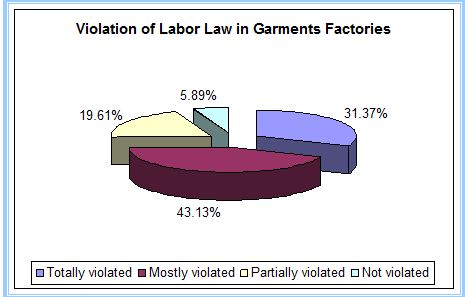Executive Summary
During the recent years the world of Business has changed vastly. We the people of different walks of life cannot be able to imagine that what is going to be the future picture if these changes continue rapidly like this speed.
This report attempts to show the emergence and implementation of labor law in the contents of Bangladesh garments sector. It is expected that this report will help to gather knowledge about labor law and realize their importance in modern business world. I tried my level best to compile information as comprehensively as possible.
I have tried my level best to complete the paper more meaning fully but at the same time I express my regret for our failure of mentioning many other important information due to very limited space allotted for assignment. However I think this study will prove pragmatic to those who feel interested in the subject.
Law
According to the oxford English Dictionary the word ‘Law’ means “rule made by authority for the proper regulation of a community or society or for correct conduct in life”. In the words of Woodrow Wilson, “Law is that portion and the established habit and thought of mankind which has gained distinct and formal regulation in the shape of uniform rules backed by the authority and power of the Government.”
Business Law
The term ‘Mercantile Law’ or ‘Business Law’ may be defined as that branch of law which comprises laws concerning trade, industry and commerce. It is an ever growing branch of law with the changing circumstances of trade and commerce.
With the increasing complexities of the modern business world the scope of Mercantile Law has enormously widened. It is generally understood to include the laws relating to contracts, Sale of goods, Partnership, Companies, negotiable Instruments sale of goods, Sale of goods and Arbitration.
Labor Law
The term ‘Labor Law’ can be defined as that branch of law which comprises laws concerning the working conditions, wage level, working environment, job securities of the employees of any business organization. It is an ever growing branch of law with the changing circumstances of business organization to facilitate the employees of any business organization.
Labor Law in Bangladesh
In the question of law it is easily say able that we the people of Bangladesh are not too much respected to the law. People do not as obedient to the law as they supposed to be. In the question of labor law there are The Factory Act 1965, which one is the establish labor law of our country. Beside this our country also obeys the rules and regulations of united nation regarding the labor or these types of community.
There are labour laws pertinent to health issues of garment workers in Bangladesh. The laws cover work hours, wages, sick leave, maternity leave and benefits, compensation and other working environment related issues. Because of the lack of implementation and/or violation of the laws, workers often suffer from health hazards both at work and at home. The problem is compounded by the fact that workers are unaware of many of the laws and the benefits they are entitled to because of lack of education and resources. The Bangladesh government, garment employers and different international and national NGOs have important roles to play in reducing the health hazards of workers. The paper discusses different types of illnesses and through narratives of women garment workers explores health hazards experienced by them. It also suggests solutions for policy-makers, NGO activists, employers and workers.
The labor law of Bangladesh contains and formed on such factors which are mentioned bellow-
- Preliminary
- Health and Hygiene
- Safety
- Welfare
- Working hours of Adults
- Child Labor
- Leave and Holidays with Wages
- Special Provisions
- Penalties and Procedures
Since we are working with the garments industries and there are some specific Export Processing Zone (EPZ) areas for the foreign investors in Bangladesh and there are some specific laws, which refer the conditional relationship between the workers and the employers of the Export Processing Zone (EPZ). The laws are covering some certain areas are-
An Act to Make Provisions Relating to the EPZ Workers Association and Industrial Relations whereas it is expedient and necessary to enact law in order to make provisions for recognizing the right of the workers to form association, regulation of relations and settlement of differences or disputes arising between employers and workers in the Export Processing Zones and for matters connected therewith and ancillary thereto.
It is hereby enacted as follows: –
- Preliminary
Short Title, Extent and Commencement
Overriding Effect of the Act
Inability to Exempt From Any Provision of the Act
- Workers Representation and Welfare Committee.
Special Definition of Eligible Worker
Registration and Status of Workers Representation And
Welfare Committee
Rights and Functions of the Committee
Meeting of the Committee
- Association
- Unfair Practices, Agreements, Etc.
- Conciliation And Arbitration
- Penalties And Procedure
- Epz Labour Tribunal, Appellate Tribunal, Etc.
- Miscellaneous
Indemnity
Bar To Linkage with Political Parties
Transitional and Temporary Provisions
Reference to CBA and WA to Include Committee
Monitoring of Referendum and Elections
Garments Industries in Bangladesh
Globalization has hit the populations of the third world hard. Unemployment has risen as established industries have been destroyed and poverty has deepened. Yet the organizations that clear the way for Foreign Direct Investment do have something to be proud of in Bangladesh – the rapid expansion of the garments industry, which now employs approximately 1.5 million people. However, for these workers the joy of having a job is marred by the harsh conditions they endure in the workplace.
Bangladesh began creating Export Processing Zones (EPZs) in 1978 to attract foreign capital and earn export dollars. In 1993 the Bangladesh Export Processing Zone Authority (BEPZA) was set up and a blanket ban on trade union activity imposed. This is obviously the most attractive feature for investors, on top of tax breaks and other incentives on offer. The EPZs now employ 70,000 workers, mostly in the garment and shoe-making industries. National labor laws do not apply in the EPZs, leaving BEPZA in full control over work conditions, wages and benefits.
However, BEPZA ignores not only national standards but its own. The guaranteed minimum monthly wages of $US70, $US 40 and $US 25 for skilled, unskilled and probationary workers respectively is a laughable fiction. As is the entitlement of permanent workers to annual festival bonuses, medical coverage, and accommodation and transportation allowance. The body has consistently refused to give out letters confirming employment and does not hire any workers on a permanent basis. In reality, earnings average about $20 per month – less than half the official rate – and workers do forced overtime under threat of dismissal. The withholding of pay for months at a time – a practice common throughout the private sector – is also the norm.
The situation in the garment industry at large is even worse. The nation’s top export earner employs 1.5 million workers under conditions of super-exploitation. The majority are young women from rural areas who have migrated to the urban centers in search of work. The sweatshops are more like prisons than factories, with no fixed hours, regular breaks or days off. Workers earn between $7 and $10 a month, for an average of 13 hours a day, up to 27 days per month. This comes to an hourly rate of two or three cents! The bourgeois media reports that the industry currently owes $ 300,000 in back pay, a staggering amount considering the miserly wages.
Garment workers change jobs frequently because of wage arrears, lay-offs, ill health or harassment from the bosses and their “security guards”. As the vast majority of employees are girls and young women – most living apart from their families – there are many cases of physical and sexual harassments.
Garments Industries in Bangladesh are a very prospecting industries in Bangladesh. The total demand of our garments can be fulfilled by the domestic made garments and so also this sector is doing very well in the sense of exporting. The major portions of our exports come from the garments industry. Even though the major portion of the government revenue comes from this sector but only few people are thinking about the present situation of the workers of this sector.
As it is very significant issue of the country so intellectuals should watch about it. They have reflected on it how the problem can eliminate on this sector.
Working environment and Law in Garments Industries in Bangladesh
There are some certain criteria in working condition. Every employer is bound to provide sound working environments for their employees according to different section of the factor is act 1965. In working environment the following criteria’s should be provide by the environment for employees of his/her organization. This are-
Health and Hygiene
- Cleanliness *
- Disposal of wastages and effluents**
- Ventilation and temperature**
- Dust and fume**
- Artificial humidification***
- Over crowding***
- Lighting**
- Drinking water**
- Latrines and urinals**
- Spittoons***
Safety
- Precautions Incase of fire**
- Fencing of machinery***
- Working on or near machinery in motion***
- Employment of children’s on dangerous machines***
- Striking gear and devices for cutting of power***
- Self acting machines***
- Causing of new machineries**
- Prohibition of employment of women and children near cotton openers***
- Revolving machinery**
- Floors stairs and means of access.*
- Excessive weights.*
- Production of eyes.*
Welfare
- Washing facilities. *
- Fast aid appliances. **
- Shelters. **
- Canteens.*
- Rooms for children’s. **
Working hours
- Weekly hours. ***
- Weekly holiday. **
- Compensatory weekly holiday. ***
- Daily hours. ***
- Intervals for rest or meals.*
- Spread over. ***
- Night shift. ***
- Prohibition of overlapping shift. **
- Extra allowance for over time. **
- Restriction on double employment.
Employment of young person
- Prohibition of employment of children. ***
- Certificate of fitness. ***
- Working hours for children’s. ***
- Register of child workers. ***
- Power to require medical examination. ***
Leave and holidays with wages
- Annual leave with wages. ***
- Festival holidays. *
- Casual leave and seek leave.*
- Maternity leave. ***
- Wages during leave or holiday periods. ***
- Payment in advance in certain case. **
Miscellaneous
- Penalties.
- Accident offences by workers.
Those are the specific criteria which are mention in the factories act 1965. Each and every section of the law is not mentioned and describe here due to the shortage of space and those are not subject related. Those laws must be followed by the employer of garments worker.
Though it is painful but it is true that most of these sections of law are violated by the most garment manufacturer of the country. These laws are violated flowingly-
| * | Marked | Partially violated |
| ** | Marked | Partially violated |
| *** | Marked | Totally violated |
The Percentages of violating law in garments factories are given bellow-
| Violation of Law | Percentages |
| Totally violated | 31.37 % |
| Mostly violated | 43.13 % |
| Partially violated | 19.61 % |
| Not violated | 05.89 % |

Above chart is describing the present scenario of the garments industries of Bangladesh. Most of the labor laws are violated by the most of the factories of the country.
Employer Obligation
The employer’s obligation is to correct all hazards identified by the consultant within reasonable period. This commitment is made in advance. The employer must also agree to post the list of hazards that accompanies the consultant’s report. If an employer refuses
to correct or verify correction of a serious hazard, the inspector may refer the matter to compliance, a violence of law.
Wage level and Law
Garments workers are not well paid and so also there are no possibilities to be the future bright. Though the garments industries are paying ill but still people are interested enough to get a job in a garments factory. The main reason behind it is the high unemployment rate of the country. People are completing there degree but they are not being able to get appropriate job according to there demand. This is why people are taking job in garments factories. The employers are taking these chances. Since people don’t have any other opportunities so they are performing the job though they are ill paid.
Leave and holidays and wages
- Annual leave with wages.
- Festival holidays.
- Casual leave and seek leave.
- Maternity leave.
- Wages during leave or holiday periods.
- Payment in advance in certain case.
Those criteria should be followed by the garments manufacturer of our country but most of them are violated.
Sex disparity in wage level is another common phenomenon in the garments factories. Some cases manufacturers are paying ill to women workers though lady workers are giving same services as like men workers.
Labor organization
Labor organizations are existed partially in garments manufacturing industry. Though partially it is existed but these organizations do not have much more freedom to do any thing for the labor people. Garments workers should given the opportunity to build a union for their better opportunity. Though the union should not be supported in any short of productive organization but in the case of garments workers it should be established. Otherwise the government should take all the necessary initiative to make their good.
Garments workers are all alone their employer will not help them to improve their luck. So it is themselves or the government who should take initiatives for them.
Future prospect and Law
Though the garments sectors are very prospective one for the Bangladesh’s economy but the people who are making this sector prospective they are not well entertained by the manufacturer and government. There are different types movements are running for them. Different communist parties, NGOs are working for their better prospect. But their condition will not improve until the economy of Bangladesh shines.
Recommendations
As the situations are changing so it can be expected by us that the present condition of our garments workers should be changed. Government of Bangladesh has to take each and every proper initiative to make there present situation better.
There are three different parties who can do some good job for a little bit food for the garments workers and these three different parties are-
- The Government
- The Employers and
- The workers themselves
Here government has some duties to performs which are mentioned bellow-
- Build a monitory commission to evaluate the performance of the garments manufacturing organizations.
- Make an institute for the garments workers so that they can improve their skills.
- Crete pressure on the garments organization to make sure that they are following the rule and regulations of the labor or industrial law of the country.
- Provide tax discount on their income to make them lead a better life.
- Ensure the industries that they are providing the standard working environment.
- Make influenced the NGO’s to be interested to work with the garments workers to improve their life style.
- Provide the night schooling facilities to make the garments workers educated which will help to improve their life.
- Make a specific area for the garments factories and arrange some housing facility so that they can live their life in a secure environment.
- Re-arrange some special bus service for garments workers which was practiced by BRTC.
- Regulate the law and make the law established and followed by the garments manufacturer organization.
- Try to build up a good relationship between the employer and the worker of garments factories.
The fact is not that to improve the present scenario it is not that the only duty to perform by the government and the employer. There are some specific duties which should be performed by the workers themselves. Because they are the real force who can improve their situation. It is for sure that nobody can help them to improve their situation until they help themselves to improve their condition.
What are the duties that the garments workers should perform to improve their present scenario? Those duties or recommendations are given bellow-
- Build up some associations to make their present situation.
- Encourage themselves to be cooperative minded and try to make some savings to make future productive investment.
- Build cooperative society to influence people to save some of their money for future.
- Encourage themselves to work together and so also live together.
- Try to make their child educated so that their children can get some better job and lead a better life.
- Be active and cheerful to improve their present situation.
The initiative which should be taken by the garments factories of our country are mentioned bellow-
- Not to over or under valued the capabilities of the workers.
- Give fair chance of the workers in recruitments of new workers.
- Give fair chance of the workers in the terms of sex disparity.
- Provide the proper working environment so that workers can work properly.
- Provide the clean and hygiene working environment.
- Provide maternity leave to the lady workers with their basic salaries.
- Provide job securities to theirs workers.
- Provide after retirement facilities like pension, provident fund and so also.
- Promotional and carrier improvement facilities so that it can make them motivated.
- Opportunities to express free opinion and freedom in performing duties.
- Opportunity to form a combined union which should be free from political influence.
- Every factory should set a standard wage level for the employees and make sure to follow that standard.
- Pay the salaries and bonus to the employees on due time.
- Fix the standard working hour for the employees and pay over time for extra work.
- Training facility for the new workers so that they can improve their skills.
- Pay the extra money for extra work with their basic salary in due time.
- Arrange some recreation for the employees as a routine work.
Limitations of the Study
The shortage of time was the main obstacles to gain the actual result. What ever the situation was I have tried my best to accomplish the given job and I do believe that people will appreciate this tiresome effort.
It was not an easy task to accomplish. The main obstacles were the short time and the lack of secondary data for the assignment. It takes a huge time to find out the real condition of law in the garments industries cause it is tough to find out that who is breaking the law and how?
I have tried my level best to complete the paper more meaning fully but at the same time I express my regret for our failure of mentioning many other important information due to very limited space allotted for assignment. However I think this study will prove pragmatic to those who feel interested in the subject.
Conclusions
In comparison the salary with the first world country the salary level of our workers are not only poor but also horrible. This is a good reason that people are investing in our country, and the main reason behind is the low labor cost. And it for sure that every people will try to make the highest output from his \ her investments. But one thing should always remember that it will not take huge amount (in compression of the investment of the employer) if the employer try to provide some standard facility to their employees and it is sure that it will not hamper their profit amount cause it will help to increase output.
Garments worker in Bangladesh are leading a very poor lives. Most of the garments working leading a life bellow the poverty line. It can be told about them that they are living hand to mouth. Salary of garments starts from only taka four hundreds and most of the cases its finish in the amount taka fifteen thousands only. These are the very poor amount to survive in current market where it takes taka twenty to purchase one kilogram rice.
The workers of garments are same as us and there is no difference in between them and we people. So people should be sympathetic about their problems and government of our country should take proper initiatives to solve their problems so that they can live a moderate life. As a citizen of this country these are their basic rights.
References
- Commercial Law by M. Ahmed.
- Mercantile Law by MC Kuchhal.
- Newspapers.
- http://www.bgmea.com/
















